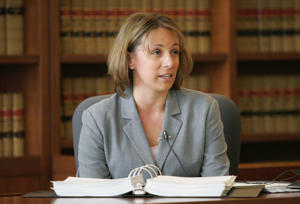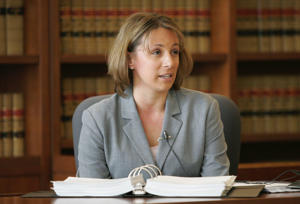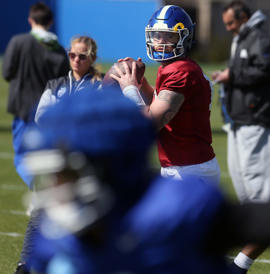When Kentucky’s head coaches gathered for a meeting this month, athletic director Mitch Barnhart emphasized one message above the transfer portal, name, image and likeness, recruiting, new facilities or anything else that could be considered the most pressing issue of the day.
Gambling in college sports was back in the news.
As a growing number of states legalize sports betting — Kentucky’s law goes into effect June 28 — expect more headlines, especially if NCAA rules stay the same.
Start the day smarter. Get all the news you need in your inbox each morning.
The current rules prohibit participants — players, athletic staff and coaches — from betting on any sport sponsored by the NCAA across high school, collegiate and professional levels. That includes sharing information like updating the injury status of a star player for sports wagering purposes.
Alabama baseball coach Brad Bohannon was fired earlier this month after being linked to suspicious wagering over the Crimson Tide’s game against LSU on April 28 at the Great American Ballpark sportsbook in Cincinnati. Ongoing investigations into a combined 41 athletes at Iowa and Iowa State and their gambling activities were also announced earlier this month.
Barnhart wants to make sure his coaches are talking about the NCAA rules enough to ensure they, and the athletes they coach, have understanding.
It’s official: Against all odds, sports betting becomes law in Kentucky
An outlier: University of Kentucky is lone SEC school where 2021-22 hoops recruiting topped football
But the NCAA needs to re-examine its rules on gambling. It’s no longer taboo, or particularly hard to do, especially on college campuses where 75% of students have bet on sports within the past year, according to the International Center for Responsible Gaming.
College football and college basketball should be the only sports that are off-limits because they have the biggest potential to be compromised. Pro sports should be fair game. So should Olympic sports in college, because there’s not a huge market or appetite to bet those sports.
Trying to ban everything is putting an unnecessary burden on an already swamped compliance staff.
Since 2004, the NCAA has commissioned a study every four years to monitor sports wagering. The latest complete survey in 2016 — the 2020 study was paused due to the COVID-19 pandemic — reported 24% of male athletes and 5% of female athletes admitted to wagering on sports within the last year.
Those results were well before the Supreme Court paved the way for states to legalize sports betting in 2018 and an avalanche of legal sportsbooks followed. It’s a safe bet those percentages have increased over the past seven years.
NCAA president Charlie Baker recognizes the challenge. One of his first moves after taking over in March was to approve a survey of youth between the ages of 18-22 to gauge their sports betting habits. A “more comprehensive” national survey of NCAA athletes is scheduled for the 2023-24 academic year.
C.L. Brown: Kentucky basketball losing offseason – faces difficult road in 2023-24 without vets
NIL, transfer portal impact: How changing college basketball landscape has altered John Calipari’s UK rosters
This is not a new issue.
City College of New York (CCNY), the only school to win the NIT and NCAA national championship in the same season, might be a college basketball blue blood today had seven players not been charged with fixing games in 1951. It caused the Board of Higher Education to ban scholarships for all of New York City’s public universities. Boston College, Tulane, Arizona State and Northwestern are also among the schools that have been compromised in the past.
Most of the worst cases involved players taking money to fix games because they had no other way of earning it under the amateur rules at the time. NIL lessens their vulnerability now.
The 2016 NCAA study found that most sports wagering involving college athletes are for low stakes: 79% of men and 95% of women surveyed lost less than $50 in a day.
And a college player putting $20 on the Steelers to win the Super Bowl is not a huge threat to college sports.
Keeping college athletes from gambling, whether in a fantasy football league or placing a bet through a sports book, is almost impossible to stop when the main tools to combat wagering are awareness and education.
Rachel Newman Baker, who is UK’s executive associate athletic director in compliance, spent 12 years at the NCAA before moving to Lexington in 2013. Part of her time at the NCAA was spent working to combat sports wagering, which she said has changed from the early 2000s because of state laws and the pervasiveness.
“If the expectation is that we’re going to completely prevent bad things from happening or scandals, then we’re starting off in the wrong place,” Baker said. “Because that’s not something that universities or athletics departments are going to be able to do on their own because of who all this issue touches.”

© RON WURZER, ASSOCIATED PRESS Rachel Newman Baker, who is UK’s executive associate athletic director in compliance, previously worked at the NCAA and spent time working to combat sports wagering.
C.L. Brown: Louisville basketball’s top-5 class strong sign of what’s to come under Kenny Payne
Changes coming: ACC changes revenue sharing structure to reward postseason success
When the current NCAA by-laws were written, the number of states where you could visit a sports book were limited to Nevada and a few others. Now, Kentucky is one of 38 states that has legalized sports betting.
Someone wanting action no longer has to park their money in some offshore on-line wagering site that makes it difficult to collect winnings. There’s been a proliferation of phone apps that make betting as easy as making a call.
That’s what got Virginia Tech linebacker Alan Tisdale. He made legal bets on the 2022 NBA Finals using the FanDuel app. The Commonwealth of Virginia legalized sports wagering in 2021; Tisdale is of age and he wasn’t betting on his sport.
None of his bets were more than $5 and he won a total of $41, according to The Athletic. When Tisdale realized his mistake, he self-reported it to the university. The NCAA still suspended him for nine games, which was later reduced to six on appeal.
“Here’s the challenge: OK, we have to educate them about sports wagering, but we also have to educate them about performance enhancing drugs,” Baker said. “And we also have to educate them about social media. And we also have to educate them about financial literacy and Alston money that they’re getting. And then we also have to educate them about speaking to the media — you see where I’m going with this?”
No matter how many conversations are had on college campuses, without changes to its rules, the NCAA is going down a narrow road where it will become more and more difficult to steer clear of trouble.
Reach sports columnist C.L. Brown at [email protected] and follow him on Twitter at @CLBrownHoops.
This article originally appeared on Louisville Courier Journal: Brown: As Kentucky and other states legalize sports gambling, NCAA needs to revisit rules

